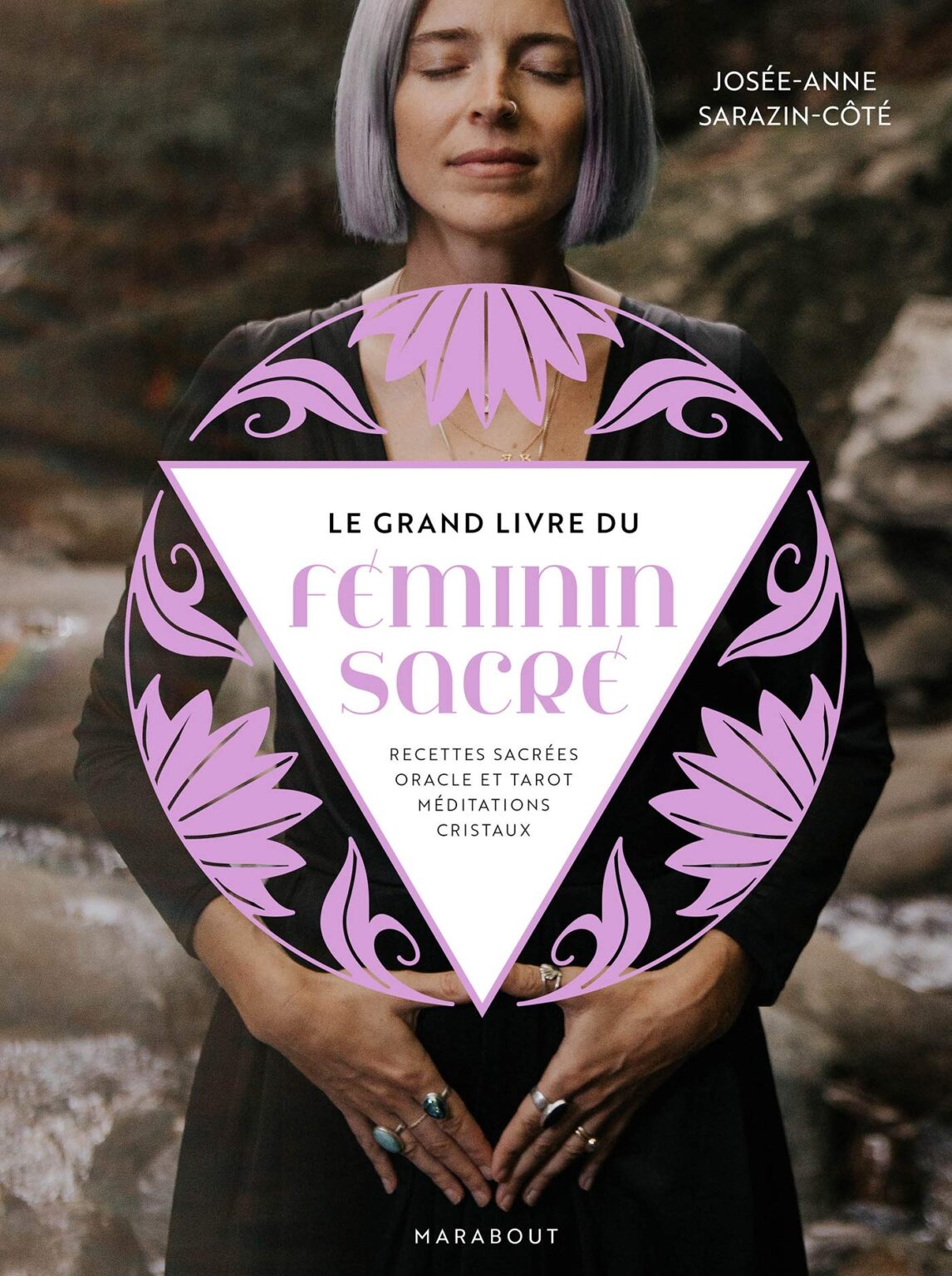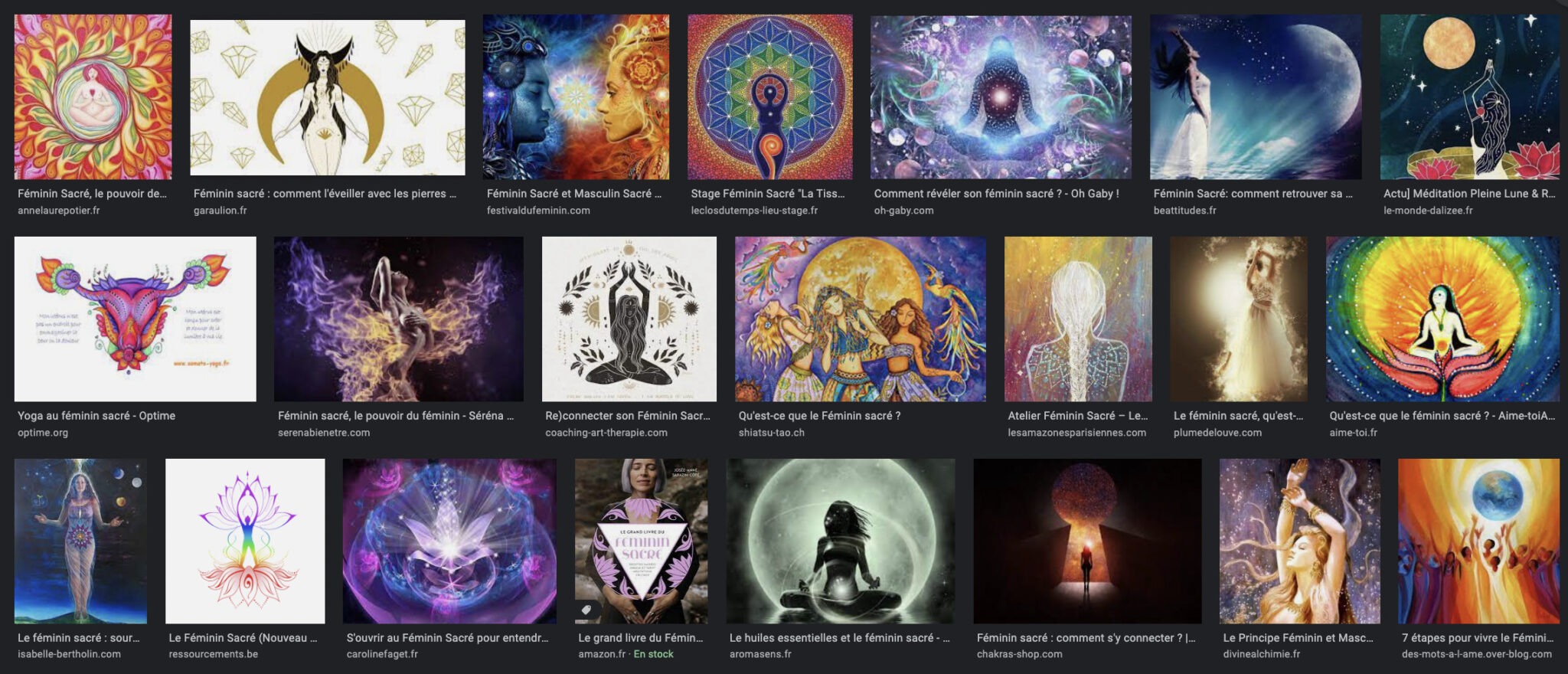“Reconnecting to your feminine energy”, “taking back the power of your biological sex”… Online or in books, you can find more and more invitations of this kind. Behind these seemingly liberating speeches sometimes hide dangers for oneself and the advance of feminist and LGBTI+ struggles.
Spiritual content mentioning the existence of a superior feminine energy, of a biological sex that would draw its strength from nature, or even of a sacred power from which women would have been disconnected, abound in our feeds social networks and on bookstore tables.
What is the “sacred feminine” and how can it be dangerous?
In summary, the “sacred feminine” refers to a deep nature of women, unaltered by patriarchal culture. This would be inherited from prehistory where what was sacred was considered feminine, supposedly. To reconnect with it, several practices exist, often linked to natural elements such as herbal recipes (like “potions of modern witches », an expression that we often find in this sphere), the use of stones and crystals to heal oneself (gold, lithotherapy is a myth contested by science), accessories such as flower crownsand other rites punctuated by the stars.
However, there is a big difference between recognizing the influence of the cycles of the moon on the rhythm of the tides, and believe that it would directly affect human menstruation, for example. To want to add spirituality to one’s life, one can quickly pour into esotericism. If it’s nothing wrong, certain drifts can prove to be dangerous for oneself.
This was the case for example mugwort-infused steam baths for the vagina recommended by Gwyneth Paltrow since 2015. A harmful practice that could have fallen into oblivion, but that was without taking into account the prescription power of such a celebrity, and the growing popularity of the sacred feminine which means that even Kourtney Kardashian says she will continue to do so in 2022.
In addition to the danger for oneself, individually, the enthusiasm for these practices can also cause harm to feminist struggles and other minorities, on a collective scale.
Indeed, some of these ideas have already largely exceeded the Internet and literary phenomenon, and we find them even in the field of motherhood, notes Illana Weizman, author of This is our postpartum and of White people like the others? Jews, blind spot of anti-racism. According to the feminist and anti-racist essayist, the main idea conveyed would be that women would carry within them a natural force that would allow them to better endure suffering while giving birth. Speeches that are intended to be empowering for women, but which are above all alienating, explains Illana Weizman at miss :
“They convey the idea that births don’t need to be as medical as they are. But the line is fine between this desire to reclaim childbirth, succeed in overcoming pain, and falling into an essentializing discourse that assigns physical characteristics to psychological traits, thus leading to sexist injunctions like the sacrificial motherhood or self-sacrifice. »
A step back for feminist struggles
While these theories may seem revolutionary, they are actually nothing new. They belong to the spiritual movement new-age dating from the 60s and advocating a return to nature. The movement is also often seen as an attempt to re-enchant the world in the face of the crisis of ideologies and the refusal of consumerism. A thought based, concerning gender, on a biological consideration of the latter, against the current of the work of feminists in recent years and advances in LGBTI+ strugglesaiming to exceed a certain binary sexist, continues Illana Weizman:
“With the sacred feminine, we return precisely to a world extremely binarywith very clear assignments at the gender level, where feminism precisely wants to emancipate itself from the biological consideration of gender, particularly at the level of sexuality, sexual orientation, parenthood. The feminism of the sacred feminine is a false feminism that makes the bed of patriarchy, because it is completely aligned with what this system expects of us. »
If bringing gender and biology closer together is an idea that could not be more regressive, it was nevertheless at the center of feminist debates not so long ago.. This was particularly the case in the 1970s, when the subject was still only academic and militant, well before its popularization following the movement #MeToo in convergence with the emergence of Gender Studies in the United States and then in Europe. This is observed with miss Marie de Gandt, lecturer in comparative literature at the University of Bordeaux:
” The popularization of feminism led to a throwback to the debates of the 1970s between the different branches of feminism, for example, between feminism essentialistwhich assumes that men and women are different by nature and biology, and feminism universalist, asserting the idea that gender is a social construct. »

Reinforce clichés to better support one’s social condition?
Although these debates between essentialist feminism and universalist feminism date back several decades, let us recall that feminism is a recent social struggle on a human scale, and that sexist clichés and body markers themselves evolve over time. We think in particular of the question of menstruationwhich has not always been a body marker, so much so that, in other times, men were also considered to have their periods. Proof that these are only social constructions, notes Marie de Gandt:
” The so-called feminine bodies are not all rhythmic in the same way, but we persist with the idea that they are every 28 days with menstruation. On the other side, the so-called masculine bodies are also rhythmic, but we are simply not interested in these rhythms. »
It should also be noted that the rhythms themselves vary according to the calendars that are used, and that time is also a construction.
Yet reattributing oneself as a woman cisgender what is considered in our society as belonging to the feminine can have a reassuring side. This phenomenon can in particular make it possible to better live one’s social condition on a daily basis, precisely by revaluing the so-called feminine characteristics. That’s what it says Daisy Letourneurblog author The Mecxplicatordeclined in test You are not born a guy – A short feminist treatise on masculinities. The trans, feminist and lesbian essayist explains to us as follows:
“We can understand that there is something rewarding when you are a cisgender woman to find yourself in this story of the sacred feminine. Being a mother, raising children, caring for others, and all those things that they do on a daily basis that are associated with being feminine do have value. Unfortunately, the patriarchal and capitalist society does not recognize them at all. »
Despite the comfort that we may feel in finding ourselves in these sacred values, it is clear that they nevertheless perpetuate confining sexist assignments, without calling them into question, continues Daisy Letourneur:
“This sacralization of the feminine is a scam. It’s a way of saying “It’s so beautiful what you do”, without asking why nobody helps women and pays them for what they do. As for the caregivers who were applauded at our windows during confinement, but whose status has never been upgraded. »

A dangerous discourse between transphobia and sectarian excesses
In addition to the perpetuation of sexist ideas or even the regression from the point of view of certain social struggles, the theories associated with the idea of the sacred feminine are also dangerous. In particular, they represent a path towards ideas transphobic. Sometimes, it is rather transphobia that serves its justification in naturalizing and essentializing notions such as those of the sacred feminine. Sometimes, these thought systems can lead to sectarian aberrations, underlines Daisy Letourneur:
“If we take the speeches of certain transphobic feminists, they are thoroughly in these notions of sacred feminine, and in other esoteric concepts. It is no coincidence that the best known of them made a retreat this summer at Thierry Casanovasguru antivaxreported several times by the Miviludes »

A striking observation, in line with other conspiracy theories, such as those which claim that there is a transphobic lobby led by Big Pharma which would force all children to transition in order to make them lifelong patients thanks to the necessary daily dose of hormones, concludes Daisy Letourneur:
“If we start to disbelieve the doctors who claim that transidentity does indeed exist, the biologists, who say that sex does not divide into two categories, it is a real gateway to obscurantist thoughts. »
The GenZ, more LGBT + than its elders? A study confirms it
Front cover photo credit: Oleg Gekman via Canva.
No, the tendency to “reconnect with your sacred feminine” is not feminist


